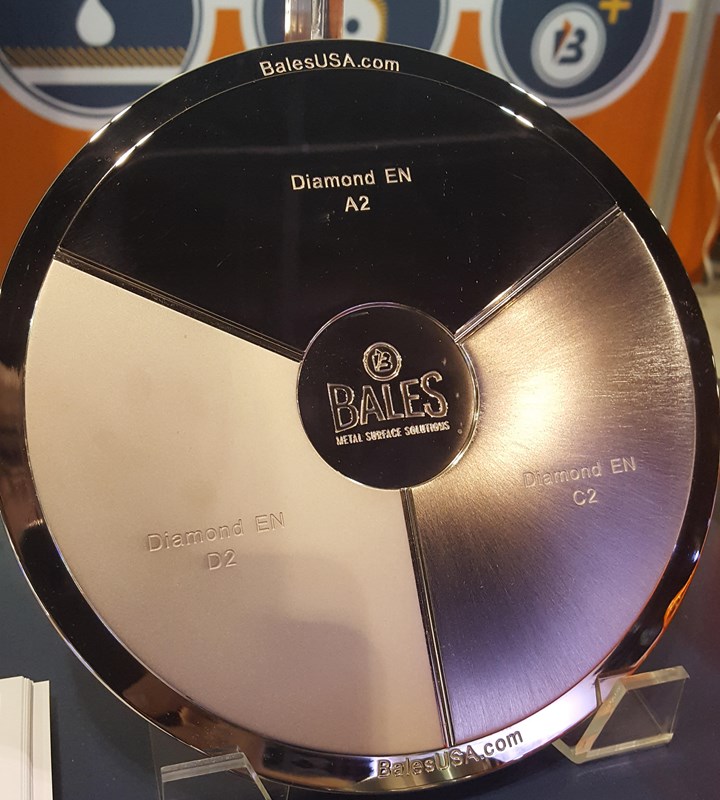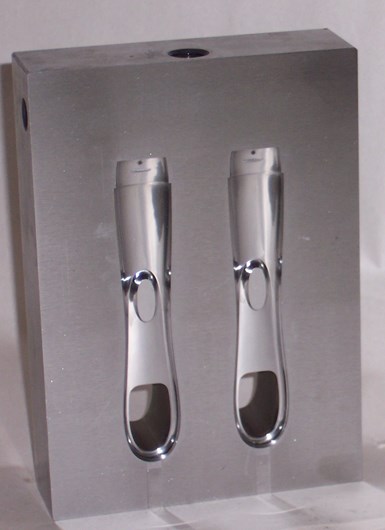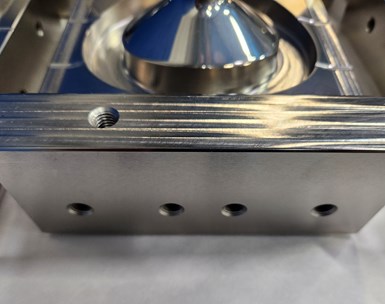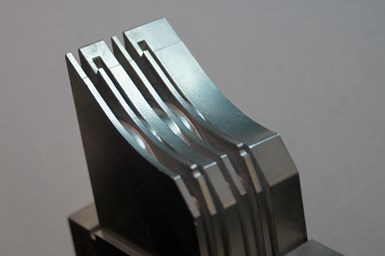Manufacturing medical components and devices requires precision and repeatability, not only in initial manufacturing, but particularly in finishing processes. Some components are machined, and others are created in molds. The molds demand the same level, or sometimes more, of precise surface finish to ensure the parts are released easily and without damage. For 45 years, Bales Metal Surface Solutions (Downers Grove, Ill.) has worked with global manufacturers to achieve the surface finishes that their operations demand. Diamond E.N. (electroless nickel) is the latest innovation in proprietary finishing products developed by the company, which has proven especially well-suited for medical device manufacturing.
Mold surface finish is critical to the quality of finished parts. Blasting with glass beads can smooth the surface and remove microcracks, tooling marks and even micro-burrs. It also helps with weld areas. Even if the blasting is managed and controlled with consistent pressure and velocity and treatment of the entire mold, additional coatings are applied to ensure an even more uniform finish and for easy release from molds. Other challenges in the medical device industry include tight production deadlines, damage to polished surfaces, corrosion and sticking parts. There are myriad coatings products that can be used to help reduce the likelihood of these issues or prevent them altogether, depending on the application. Bales offers customers engineered coatings including electroless nickel, hard chrome, diamond chrome and proprietary coatings they developed.

Bales Diamond E.N. coating doesn’t distort the finish on three different aluminum surface finishes.
Manufacturers sought an alternative to replace chrome plating, something that offered the same or more durability and added benefits. Rich Wozniak, technical sales manager at Bales, says if a customer had a mold made from a soft material such as aluminum, Bales would ask to apply a base layer of nickel to protect the substrate before finishing in chrome, which could affect tolerances. So the technical team went to work.
The Bales team of chemists, using nano-sized diamond particles, developed Diamond E.N., an electroless nickel coating with excellent hardness and lubricity. Created as an alternative product to the shop’s diamond chrome, Diamond E.N. offers 57 Rockwell hardness (RC) that can reach 70 RC after post-bake processing. In addition to hardness, the product provides excellent lubricity with a low friction coefficient (0.10) for both less wear and better release from molds.

Aluminum block mold with the interior section coated with high-polish Diamond E.N.
Diamond E.N. is applied at 185°F and can sustain a maximum operating temperature of 1,000°F — higher than most mold makers will run, according to Wozniak. The high operating temperature ensures that when mold makers are in production and get inconsistent heat or spikes, the coating won’t be destroyed like a nickel Teflon or another coating might be.
The hardness of the material makes it an excellent choice for molds that are typically chrome plated, that have deep ribs or pockets due to its superior flowability, said Wozniak. “Odds are with chrome, you aren’t going to get into the corners of the molds as easily, but the Diamond E.N. flows very evenly,” he says. “It’s also excellent for higher glass-filled materials, PVC molding that requires higher temperatures,” he continues. It also has a plating thickness range that is superior ranging from 0.00005 to 0.0005 inches with a density of 8.1 g/cm3. It can also be easily stripped if required, such as if there is an engineering change to the mold.

Medical device block made from H-13, coated with Diamond E.N. with post-bake hardness of 70 RC.
Game changer for medical device manufacturers
A long-term Bales customer manufactures 60 million units of disposable allergy skin testing devices per year. Each of these devices has proprietary steel inserts with a very sharp, perfectly shaped point for exposing the patient to the serum used for testing. The testing apparatus is applied to the patient’s skin for a couple of seconds, and there is a visible impression made when the device is applied with proper pressure, so precision is key to manufacturing the devices. The customer found that during the molding process, these very tiny inserts sometimes stuck to the molds, damaging the tips from improper release. The tight tolerance of this part required a new solution, so Bales conducted tests with Diamond E.N., coating part of a tool for testing by the customer. Initial tests showed such satisfactory results, the customer sent an additional 256 parts to coat. The customer also said that Bales has done thousands of these parts for them and never lost a single unit, attesting to the quality control and diligence at the company.
Another customer that builds plastic injection molds for the medical industry and others, has worked with Bales since 2008. Many of their molds consist of ferrous and non-ferrous metals that need protection from high-temperature plastics, caustic and abrasive materials. Their current coatings were failing, causing parts to stick and delaminate, and other suppliers couldn’t provide a solution. But Bales came through for them. By coating the molds with Diamond E.N., the customer has noticed improved wear resistance from protecting the base material. They also say the coated molds have significantly reduced cycle times — up to a few seconds faster per cycle in some cases — molds that hold up to outgassing and are evenly coated specifically in deep, ribbed areas in the molds. End customers benefit from these faster cycle times, less downtime from mechanical issues with the molds, and reduced maintenance cost for the company that they can pass on to their customers.

Mold core coated with Diamond E.N. for easy release.
As an industry that has been stretched to its limits in the last few years, medical device companies can’t afford downtime or avoidable problems in manufacturing core devices and components. By partnering with companies like Bales and taking preventative measures to properly coat their molds with specific engineered coating solutions, downtime can be reduced and quality improved for more efficient operations.
Related Content
Finishing High Reliability, Function Critical Parts
From safety critical automotive and aerospace components to lifesaving medical micro-components and implantable devices, Indiana-based Electro-Spec finishes applications that require zero failure rates.
Read MorePrecision Coating Receives ISO 14001 Certification
The company says its commitment to the environment and its health led it to seek this certification.
Read MoreTop Shop Builds Original Systems for Coating Medical Devices
Engineers at Surgical Coatings in Colorado have been ingeniously developing their own equipment, automation, processes and software since this powder coater’s inception in 1995.
Read MoreSilica-free Abrasive Compounds Offer Improved Health, Safety
Osborn has a line of silica-free abrasive compounds that offer both employee and environmental benefits.
Read MoreRead Next
Finishing High Reliability, Function Critical Parts
From safety critical automotive and aerospace components to lifesaving medical micro-components and implantable devices, Indiana-based Electro-Spec finishes applications that require zero failure rates.
Read MoreCustom Plating Technology Enables Medical Devices
Finisher collaboration during product design delivers plating solutions for medical OEMs.
Read MoreHow Vapor Degreasing Helps Medical Devices Cross the Finish Line
Vapor degreaser cleaning can be simple, predictable and repeatable, making it a good fit for medical device manufacturing.
Read More









.jpg;maxWidth=300;quality=90)












